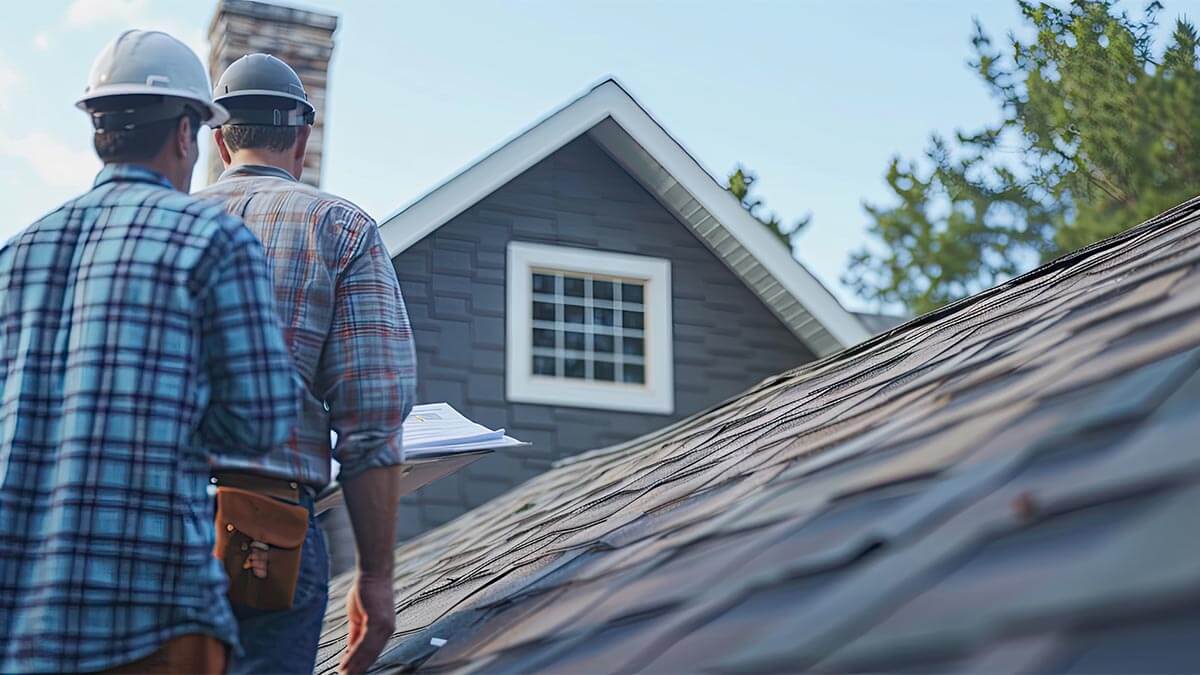Considering the high cost of materials and labor, today’s buyers are more motivated than ever to purchase properties that don’t require substantial repairs. This poses a particular challenge for homeowners facing roofing problems. For those deciding whether to repair a roof before selling, this article will cover the costs involved in repairs, the impact a bad roof can have on home sales, and some alternatives to fixing a roof before making a sale.
Selling your home as-is to a cash buyer like iBuyer.com can save you money, stress, and time. With our platform, you can receive a fair cash offer, regardless of your roof’s condition.
Selling a Home With a Bad Roof
Compare Cash Offers from Top Home Buyers. Delivered by Your Local iBuyer Certified Specialist.
One Expert, Multiple Offers, No Obligation.
The cost of a new roof
Realtors love new roofs because they make a convenient selling point. Buyers love them because they make insurers and mortgage lenders happy and increase the chances that they’ll get to spend what little savings they have on “fun” upgrades rather than boring but necessary infrastructure projects.
For existing homeowners, however, roofs tend to be nothing but a headache. The average cost to replace a roof is around $11,500. Actual costs can be much higher depending on:
- Geographic location
- Roof condition
- Roofing material
- Roof slope and features
Large, steep roofs can cost as much as $100,000 to replace.
To make matters worse, while replacing a roof can impress would-be buyers, it has a depressingly low rate of return on investment. Homeowners who put a new roof on their property typically recoup less than 60 percent of their investment when they sell. This is far below the average return for truly valuable, high-impact renovations.
Thus, based on the financials alone, it doesn’t make sense to replace a roof before selling a house.
Hidden costs of new roofing
Of course, the upfront cost of replacing a roof is only one piece of the bigger story. Replacing a roof carries a variety of hidden costs, as well.
1. Time
Americans across the board are facing a time crunch. Most homeowners seeking to sell simply do not have the spare hours to:
- Research roofing materials, costs, and providers
- Contact numerous providers for inspections and quotes
- Take time off from work to be around while roofers strip off their old roof and install a new one
Making that time can entail using up precious vacation days from work or putting off other critical pre-sale tasks.
2. Timing
Traditionally, the housing market is at its most robust during spring and summer. Families prefer to move when their children are between grades and when the weather is accommodating. Buyers don’t want to move around the holidays or when winter weather makes the process of moving unpleasant and potentially dangerous.
Unfortunately, across much of the nation, spring and summer are also the most feasible times to replace a roof. This means that sellers who decide to put a new roof on may have to delay posting their homes for sale. This can cause them to miss key sale windows in their market.
Timing can also be a problem for homeowners struggling under the weight of a home they inherited or who need to sell their house to complete a divorce or other legal proceedings. Waiting to put a new roof on can saddle these property owners with months of additional expenses in the form of:
- Maintenance
- Mortgages
- Insurance
- Taxes
3. Associated costs
Replacing a roof often comes with secondary or related costs as well. Homeowners may find that they need to repair damage to the support structures of their roof or that replacing the roof exposes damage from leaks and other sources. They then have to fix those problems, too, before they can finish the roofing project and sell their homes.
Impact of bad roofing on home sales
If replacing the roof on a home before selling is such a terrible bargain for sellers, many homeowners wonder, does that mean they can just sell their homes with a bad roof?
Frustratingly, the answer tends to be “not if you want to sell via the traditional real estate process.” To understand why, you simply need to look at the standard homebuying requirements.
Inspection
Before any traditional buyer can purchase a home, the property must be inspected. This is because homebuyers who need a mortgage can only purchase properties that meet lender standards.
Lenders require that homes meet standardized safety and habitability requirements. They also require that buyers purchase insurance on their homes.
Roofing is such an integral part of a home that:
- Inspectors must examine and report on the state of the roof
- Insurers may refuse to fully insure a property with a roof in poor repair
- Lenders will not approve a mortgage for a property with a roof in poor repair
Costs
Many homebuyers dig deeply into their savings for a downpayment on a home. This leaves them without the financial reserves to tackle big house projects like roofing for some time after they purchase their new home. As a result, they will shy away from homes that promise to need new roofs or other major renovations in the next five years or so.
Compromises
All of these factors ultimately make selling homes that need new roofs challenging. Buyers, their mortgage lenders, their insurers, and their agents will all push for sellers to replace a roof or substantially drop the price of the home to compensate. This can leave sellers feeling as though they are trapped in a no-win situation.
A word about disclosure
It is not uncommon for sellers to wonder if they can try to sell their house anyway and hope that buyers and inspectors don’t notice the state of the roof until after the sale is complete. While this question is understandable, the idea is not viable.
First, in every traditional sale, a home inspector must review and record the state of the roof. This is a non-negotiable part of the process for buyers who need mortgages and home insurance.
Second, all states have some form of disclosure law. While these laws can vary slightly, they are all the same in that sellers who conceal housing problems or fail to disclose known defects can later be sued by the buyers.
Property owners whose roofs are in poor repair must address the problem directly.
Cash buyers: The better alternative
Property owners struggling under the weight of a bad roof can feel backed into a corner. Traditional sales are troublesome and replacing their roofs is unrewarding. What alternatives does that leave?
Enter cash buyers. These investors make cash offers on houses. This enables them to buy houses without the traditional restraints that other buyers face.
No mortgages
Cash buyers do not need to qualify for mortgages. This means that they can purchase homes that do not meet standard inspection criteria, including homes with bad roofs. It also means that they can close on homes faster because they do not have to wait on mortgage lenders to process paperwork related to the sale.
No commissions
Cash buyers also work with sellers directly. This cuts out all of the middlemen involved in traditional sales. Cutting out the middlemen eliminates fees and keeps costs down.
All of that saved money can then be split between buyers and sellers, enabling cash buyers to give sellers the best possible prices for their homes.
No sale prep
Cash buyers also specialize in seeing homes for their potential. Unlike traditional buyers, they don’t need sellers to invest thousands of dollars and weeks of their time into:
- Renovations
- Staging
- Curb appeal
This makes them ideal for sellers dealing with homes in poor condition, probate, divorce, tax liens, and other complicated situations.
No delays
Selling to a cash buyer cuts out all manner of time-consuming steps and sources of delay in the home sale process, including:
- Dealing with mortgage lenders and insurers
- Getting home inspections
- Relaying communication through realtors and other third parties
- Complex pricing negotiations
- Working out compromises and contingency agreements
- Making repairs to meet sale criteria
This enables cash buyers to close on home sales in a matter of days. Sellers can:
- Apply for a quote online from the comfort of their homes at any time
- Receive a quote almost immediately
- Work with cash buyers directly via phone and email
- Have cash in hand and be free of the burden of their home in just a few days or weeks
Many cash buyers will even pay the closing costs, allowing sellers to keep as much cash in their pockets as possible.
Can you sell a house that needs a new roof to a cash buyer? You can. In fact, it is likely to be the best possible option for your situation.
See what your house is worth
Selling a house with a bad roof doesn’t have to be a nightmare. In fact, selling a home that needs work to a cash buyer can be faster and easier than selling a perfect house via a traditional sale. Request a quote today and discover how much you can get for your home with no repairs or roof replacements required.




